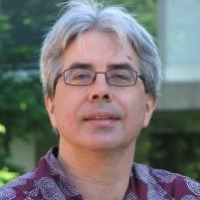James Harley

Professor
College of Arts
School of Fine Art and Music
Guelph, Ontario
jharley@uoguelph.ca
Office:
(519) 824-4120 ext. 52989
Expert In
Bio/Research
Dr. Harley teaches digital music, composition, and related courses. He obtained his doctorate in composition at McGill University in 1994, after spending six years (1982-88) composing and studying music in Europe (London, Paris, Warsaw). His music has been awarded prizes in competitions in Canada...
Click to Expand >>
Click to Expand >>
Bio/Research
Dr. Harley teaches digital music, composition, and related courses. He obtained his doctorate in composition at McGill University in 1994, after spending six years (1982-88) composing and studying music in Europe (London, Paris, Warsaw). His music has been awarded prizes in competitions in Canada (CBC, New Music Concerts, SOCAN), USA (McKnight Foundation), UK (Holland Prize, Huddersfield Festival), France (Bourges, MC2), Poland (Lutoslawski, Serocki), Japan (Irino), and has been performed and broadcast around the world. Some of Harley's compositions are available on disc (Artifact, ATMA, Centrediscs, Kappa, McGill, Musicworks, PeP, Soundprints) and his scores are primarily available through the Canadian Music Centre and Art Music Promotion.
He has been commissioned by, among others, Codes d'Accs, Continuum, Ensemble contemporain de Montréal, Hammerhead Consort, Kappa, Kore, Kovalis Duo, New Music Concerts, NUMUS, Oshawa-Durham Symphony, Open Ears Festival, Polish Society for New Music, SMCQ, Transit FestivalBelgium, Trio Phoenix, Vancouver Bach Choir. He composes music for acoustic forces as well as electroacoustic media, with a particular interest in multi-channel audio.
According to Marc Couroux (Musicworks 69), Harley's music "resides at the intersection of a network of influences (and) rather than proliferating from a central ideology, Harley accepts that the complexity of nature requires a more artistically imaginative interpretation than the simple extension of an Arcadian, placid contemplation. Harley consequently oriented himself towards the theory of chaos, which derives its principles from a much more global study of natural mechanisms than was previously allowed due to hyperspecialization. James Harley defends on the highest level the great Canadian creative tradition, rooted in the natural world, a metaphor for the irreducible complexity of Canada and, by extension, of universal humanity."
Click to Shrink <<
He has been commissioned by, among others, Codes d'Accs, Continuum, Ensemble contemporain de Montréal, Hammerhead Consort, Kappa, Kore, Kovalis Duo, New Music Concerts, NUMUS, Oshawa-Durham Symphony, Open Ears Festival, Polish Society for New Music, SMCQ, Transit FestivalBelgium, Trio Phoenix, Vancouver Bach Choir. He composes music for acoustic forces as well as electroacoustic media, with a particular interest in multi-channel audio.
According to Marc Couroux (Musicworks 69), Harley's music "resides at the intersection of a network of influences (and) rather than proliferating from a central ideology, Harley accepts that the complexity of nature requires a more artistically imaginative interpretation than the simple extension of an Arcadian, placid contemplation. Harley consequently oriented himself towards the theory of chaos, which derives its principles from a much more global study of natural mechanisms than was previously allowed due to hyperspecialization. James Harley defends on the highest level the great Canadian creative tradition, rooted in the natural world, a metaphor for the irreducible complexity of Canada and, by extension, of universal humanity."
Click to Shrink <<